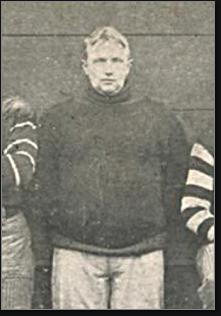|

Blondy Wallace
Sport: Football
Born: 1879
Died: March 5, 1937
Town: Egg Harbor
Charles Edgar Wallace was born in Egg Harbor around the year 1879. The e boy called “Blondy” was fast and physical, and had a freewheeling personality. He also was enormous in comparison to his peers. Football was tailor-made for Blondy, and he excelled on the gridiron for the Peddie Institute (now the Peddie School), leading the Falcons to state titles in 1896 and 1897. From there, he enrolled at the University of Pennsylvania, where he became an All-American tackle. At 240 pounds, he was an immovable object.
In an era when amateurs often played for pay under assumed names, Blondy was in high demand. In 1902, the Phillies baseball team started a pro football squad. Seeing an opportunity to cash in on his fame, Blondy approached the owner of Philadelphia’s other team, the Athletics, with the idea of forming a rival squad. He was named coach of the Athletics football team. The team manager was Connie Mack. The two are seated side-by-side in the team picture. The Athletics played in the first iteration of the National Football League and went 5–2–2 under Blondy’s guidance in 1902.
The league folded after the season, but Blondy was part of a new team made up of Athletics and Phillies that competed in the World Series of Football, played in Madison Square Garden, on 23rd Street. In the first indoor football game on record, Blondy’s “New York” team lost to Syracuse. Blondy stayed and played in the championship game for Syracuse as an injury replacement for Glenn Warner (who later went by “Pop”). Syracuse beat the Knickerbocker Club for the title, 36–0.
In 1903, Blondy served as captain of the Franklin Athletic Club, which boasted a powerhouse lineup that included Eddie Wood, Clark Schrontz and Curly Davidson—all huge names in the pro ranks of that era. Blondy’s big, bruising linemates included Jack Lang, Herman Kerchoff and Pop Sweet. Franklin played 12 games and did not allow a single point. They scored between 12 and 74 points on the way to a dozen victories. The team entered the second (and final) World Series of Football and defeated defending champion Syracuse to advance to the title game. Franklin upended the Watertown Red & Black 12–0.
In 1904, Blondy—who was chronically in debt— jumped around in pursuit of the best paycheck, and also refereed games when he wasn’t in uniform. In 1905, he took over the team in Canton, Ohio, later to be named the Bulldogs. This was perhaps the most prestigious job in the professional game at the time, as Canton was the epicenter of pro football. One year later, a newspaper printed a story accusing Blondy of throwing a game between the Bulldogs and Massillon Tigers. He sued the paper for libel and the case was settled out of court. But he was essentially done after that as an admired coach and player, even though most researchers and historians believe he was totally on the level. Thetragedy is that, after that season, pro football fans in the region stopped going to games in droves, prematurely ending an important era in the development of the pro game.
Blondie spent a lot oftimes in saloons during his 20s, so it was little surprise that he got into the liquor business after football. During the Prohibition Era, he became a prominent bootlegger, operating out of Atlantic City, which was famously run by Knucky Johnson. Ironically, the law caught up with Blondy after Prohibition was repealed. He was charged with tax evasion and spent a year in jail after the government got a hold of the books from his brewery in Egg Harbor. A heavy drinker, Blondy died from liver disease in 1937.
|
|
|